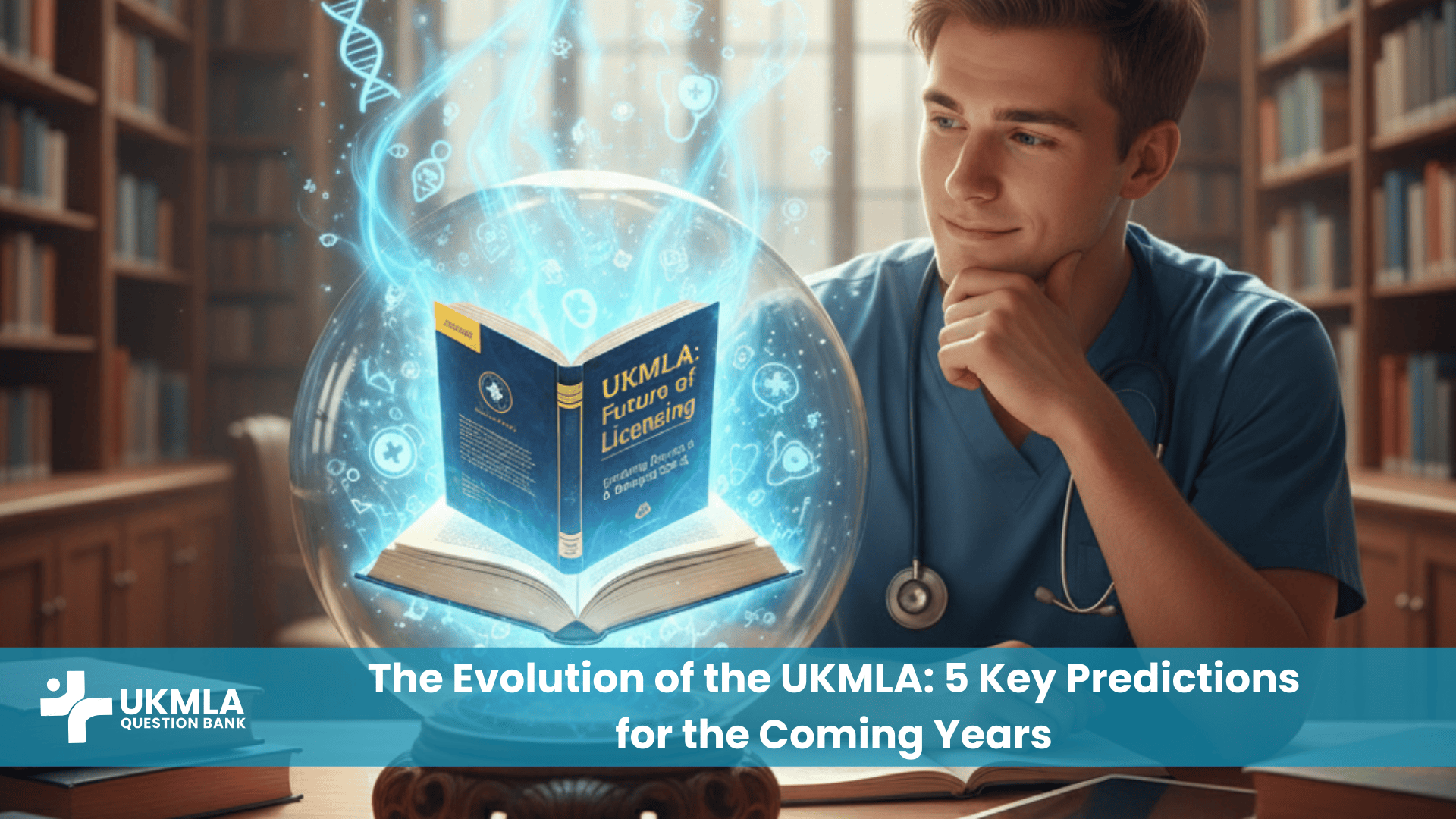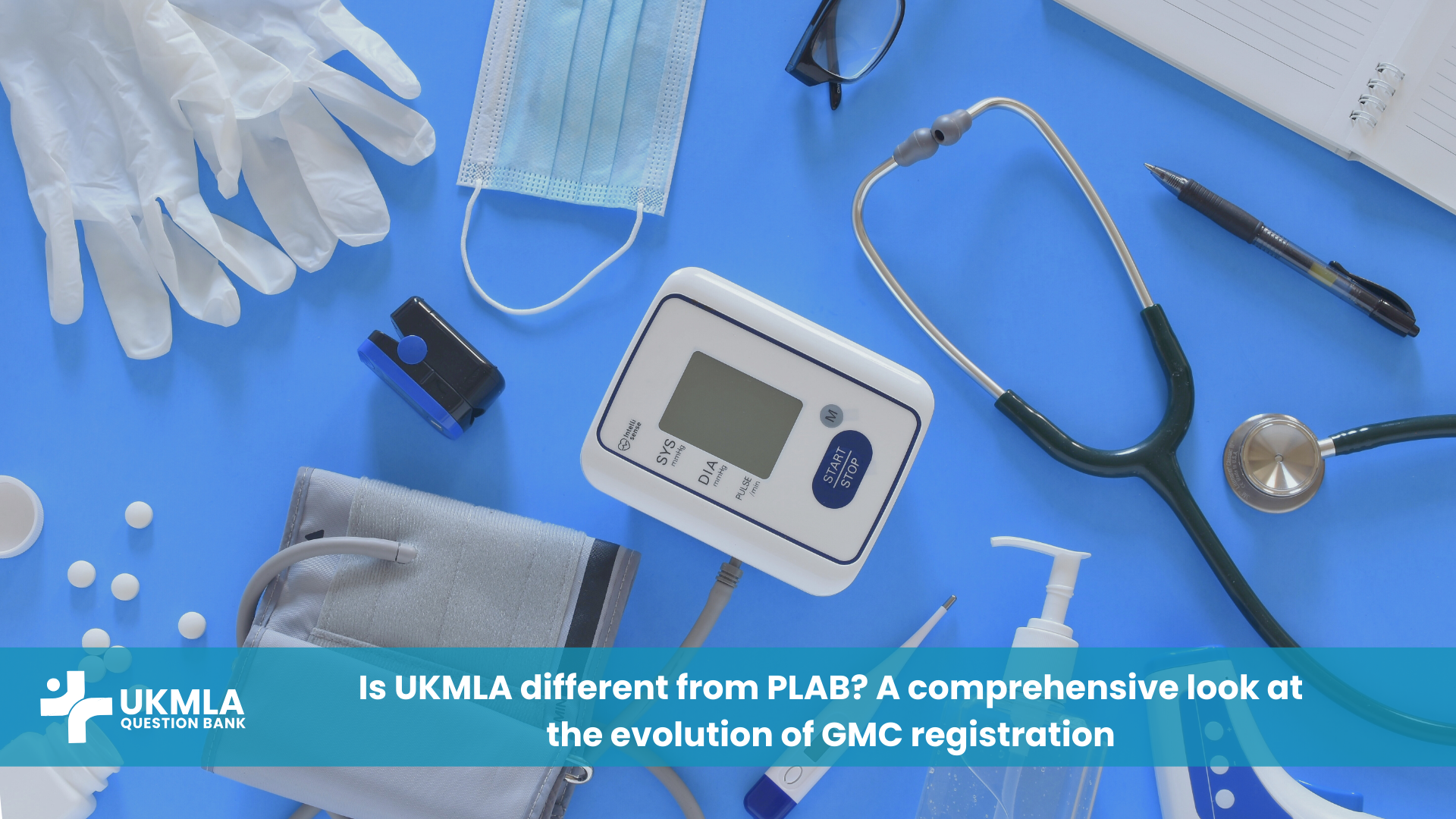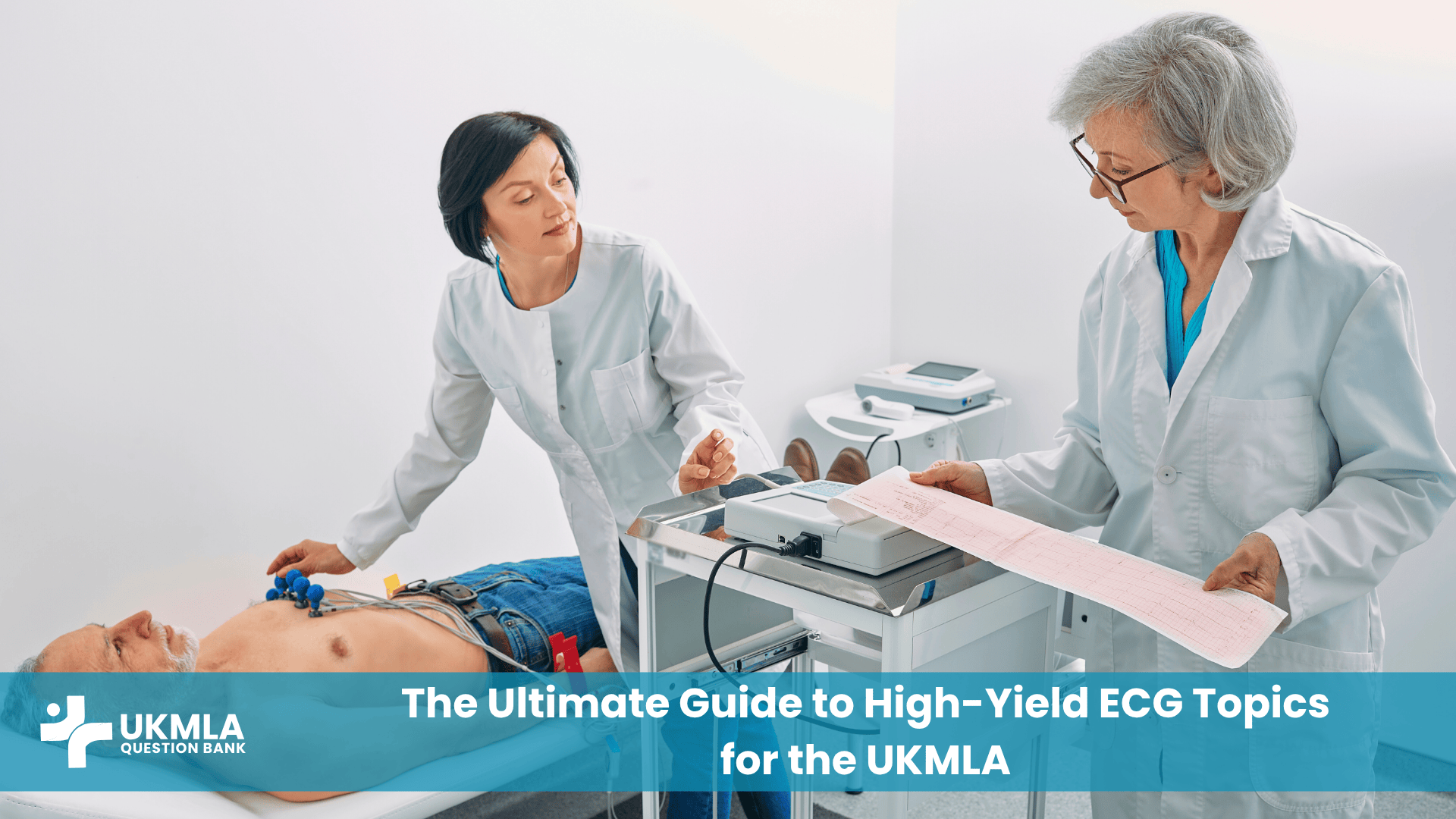Introduction
Potential UKMLA exam changes are a source of significant interest and anxiety for medical students and international graduates alike. The UKMLA is the new standard for medical licensing in the UK, but medical assessment is never static. It constantly evolves to reflect changes in healthcare, technology, and societal needs, marking a significant transition from the old system, which you can read about in our comprehensive look at the evolution from PLAB. As a high-stakes licensing exam, the UKMLA must remain relevant, fair, and a robust measure of a doctor’s readiness for safe practice in the modern NHS.
While the General Medical Council (GMC) provides a clear framework for the current exam, it’s wise for future candidates to look ahead. Understanding the direction of travel for medical assessment can provide a significant advantage in long-term preparation. Many of the potential shifts are outlined in the landmark The Topol Review, an official report on the future of the UK healthcare workforce. This article moves beyond the current format to offer five evidence-based predictions on how the UKMLA is likely to change in the coming years.
Table of Contents
TogglePrediction 1: Greater Integration of Technology and AI
The most visible changes to medical assessment will undoubtedly be driven by technology. The NHS is undergoing a digital transformation, and its licensing exam will follow suit. This aligns with the vision outlined in our previous post on how AI and technology will reshape the UKMLA.
AI-Adaptive Testing for the AKT
One of the most significant potential shifts is a move away from static, fixed-length exams towards AI-powered adaptive testing. In this model, an algorithm adjusts the difficulty of questions in real-time based on your performance. Answer a hard question correctly, and the next one gets even harder. Struggle with a topic, and the AI will present an easier question to accurately find your level of competence. This creates a more precise, efficient, and personalized assessment of a candidate’s knowledge, offering a much richer picture than a simple pass/fail score.
Virtual Reality (VR) Patients for the CPSA
The CPSA currently relies on actors to simulate clinical scenarios. The future likely involves immersive VR simulations. Imagine a station where you put on a headset and are placed in the middle of a realistic A&E resuscitation bay or a busy GP clinic. You would interact with a virtual patient who can display dynamic physical signs, respond to your questions, and even show emotional reactions. This technology allows for the assessment of high-stakes emergency scenarios in a perfectly standardized, safe, and repeatable way, something that is impossible to achieve with human actors alone.
Automated Feedback and Scoring
Artificial intelligence, particularly Natural Language Processing (NLP), is becoming increasingly adept at analyzing human communication. In the future, AI could be used to provide objective scoring and instant feedback on CPSA stations. An algorithm could analyze the structure of your history taking, your use of empathetic language, and the clarity of your explanations to the patient, providing a more consistent assessment and offering you detailed, immediate feedback on your specific strengths and weaknesses.
Prediction 2: Increased Emphasis on Professionalism and Ethics
As AI handles more of the data-driven aspects of medicine, the uniquely human skills of a doctor become even more important. The UKMLA will likely evolve to assess these attributes more rigorously.
More Complex Ethical Scenarios
Expect a move beyond straightforward ethical questions. Future CPSA stations and AKT questions may present more nuanced ethical dilemmas that reflect modern medical challenges. This could include scenarios involving digital ethics (e.g., handling a social media breach), resource allocation on a struggling ward, or complex consent issues related to genomic medicine. A strong foundation can be found in our guide to UKMLA Medical Ethics and Law.
Situational Judgement Testing
The UKMLA could incorporate more elements of situational judgement testing (SJT). Rather than just testing what you know, these questions assess what you would do. You might be presented with a challenging professional situation—such as dealing with an incompetent colleague or handling a patient complaint—and asked to rank the appropriateness of various actions. This tests your professional attributes and judgement under pressure.
Prediction 3: A Deeper Focus on “Readiness for Safe Practice”
The ultimate goal of the UKMLA is to ensure a doctor is safe to practice. Future changes will likely sharpen this focus, moving away from esoteric knowledge towards practical, day-one competencies.
More Integrated Prescribing and Patient Safety Questions
Expect fewer questions on obscure biochemical pathways and more integrated clinical scenarios that test real-world skills. This means a heavy emphasis on safe prescribing, pharmacology, and therapeutics. Questions will likely test your ability to recognize common prescribing errors, manage polypharmacy in the elderly, and understand the principles of antimicrobial stewardship. For a refresher, see our guide on Prescribing Safely for the UKMLA.
Focus on Human Factors and Systems-Based Practice
Modern patient safety theory emphasizes that errors are often caused by bad systems, not bad people. The UKMLA may evolve to assess a candidate’s understanding of human factors and systems-based practice. This could involve questions about the importance of checklists, structured handovers (like SBAR), and how to raise concerns when you see a safety risk within the hospital environment.
Prediction 4: Evolving Content Based on UK Health Trends
A static exam quickly becomes irrelevant. The UKMLA’s content will need to be dynamic to reflect the changing health needs of the UK population.
Greater Focus on Geriatrics, Mental Health, and Public Health
As the UK population ages, conditions like dementia, frailty, and polypharmacy become more important. Similarly, mental health and public health are major NHS priorities. Expect the balance of the UKMLA’s content to shift over time, with a greater proportion of questions dedicated to these high-priority areas.
Dynamic Updates to the GMC Content Map
The GMC’s UKMLA content map is the blueprint for the exam. Currently, it’s a relatively fixed document. In the future, expect it to become a more “living document,” with more frequent updates and amendments to reflect new NICE guidelines, emerging infectious diseases, and other shifts in clinical practice. Keeping an eye on the official GMC UKMLA Content Map will be more important than ever.
Prediction 5: Changes to Logistics and Global Accessibility
For the thousands of IMGs who take the UKMLA, the logistics of the exam are a major factor. The GMC will likely continue to evolve the exam to make it more accessible.
Expansion of International Testing Centres
A major difference between the UKMLA and the old PLAB system is the current requirement for the CPSA to be taken in the UK. In the coming years, it is highly probable that the GMC will establish international CPSA testing centres in key regions around the world. This would reduce the significant financial and logistical burden on international candidates.
The Future of Remote Proctoring for the AKT
The COVID-19 pandemic accelerated the adoption of remote exams. While in-person testing remains the standard for the AKT, the continued development of secure, AI-driven remote proctoring could allow for more flexibility in the future. This could make it easier for candidates in remote locations to sit the exam without travelling to a major test centre.
How Will These Potential UKMLA Exam Changes Affect You?
Understanding these potential UKMLA exam changes isn’t just an academic exercise; it should inform your long-term preparation strategy. While the core medical knowledge remains vital, you should also focus on developing skills that are future-proof. This includes improving your digital literacy, engaging deeply with ethical principles, and always grounding your learning in the context of patient safety.
Frequently Asked Questions (FAQ) about the Future of the UKMLA
The difficulty will likely remain benchmarked at the level expected of a newly qualified UK doctor. However, the format and content focus will change, which may require candidates to develop new skills (like digital literacy).
Major medical exams typically undergo significant reviews every 5-10 years, with minor adjustments to content (like the question bank) happening continuously.
The pass mark is set using standard-setting methods based on the performance of a reference cohort of UK medical students. As such, it will fluctuate slightly from exam to exam but will always represent a consistent standard of competence.
Not in terms of content or standard. The UKMLA is a single standard for all. However, changes to logistics, such as adding more international test centres for the CPSA, would have a major positive impact on IMGs.
A foundational understanding of the principles of clinical genetics and pharmacogenomics is already in the GMC content map. A deep, specialist knowledge is not required, but understanding the core concepts is already important.
The official GMC website and the Medical Schools Council website are the only definitive sources of information. Always be wary of unofficial news or rumours on social media.
This is unlikely for the AKT. A numeric score is a valuable piece of data for medical schools and for the Foundation Programme application process. The CPSA is, and will likely remain, a pass/fail assessment.
For now, focus on the core clinical skills being tested: structured assessment, clear communication, and correct management. The medium (VR vs. an actor) may change, but the medical principles remain the same.
Exam fees are reviewed periodically. The integration of expensive new technologies like large-scale VR could potentially lead to fee increases in the long term, but this is purely speculative.
This is extremely unlikely in the foreseeable future. The UKMLA has been a massive, multi-year project to create a single, unified standard. It is here to stay for a long time.
Conclusion
While the exact timeline is uncertain, the direction of travel for the UKMLA is clear. The exam will become more technologically integrated, more focused on professional ethics and safety, and more dynamic in its response to the changing needs of UK healthcare. The five predictions outlined above—greater integration of tech, a deeper focus on ethics, a sharpening of patient safety, evolving content, and improved logistics—represent the most likely path of this evolution.
For medical students and junior doctors, this is not a cause for alarm but a call to prepare intelligently. By focusing on the timeless principles of medicine—deep knowledge, sound clinical reasoning, and compassionate communication—while also embracing the need for digital literacy, you will be well-equipped to succeed. The format of the exam may change, but the core competencies of a good doctor are constant, and that is ultimately what the UKMLA is designed to measure. Following these essential tips for success will always be relevant.




